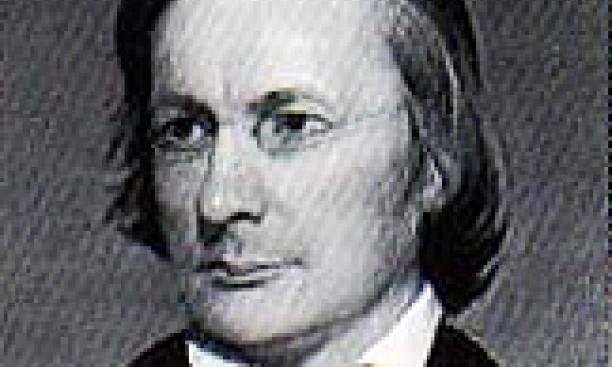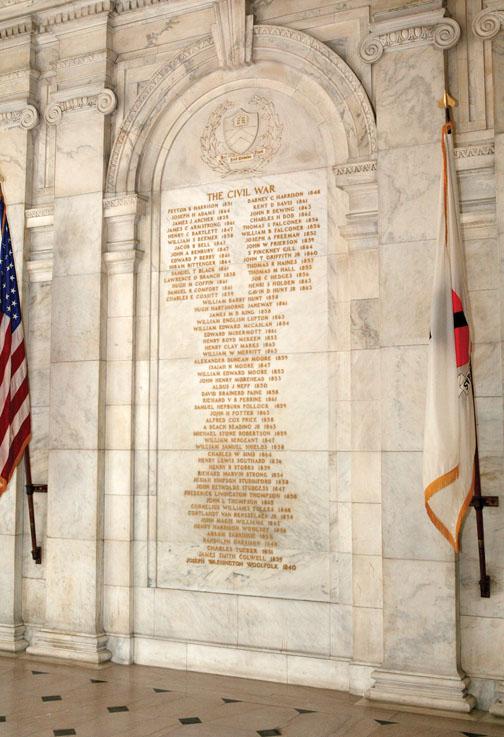

– Abraham Lincoln, Second Inaugural Address, 1865
To begin with, there is one thing we need to remember: John Maclean Jr. 1816 was a lifelong bachelor.
His unfailing first impulse was always, as we now say, other-oriented. His drive to theology and teaching was so strong that, immediately after his graduation from Princeton college at 16 years old, he enrolled at the new seminary down the block, although it was run by the prigs who had fired his revered late father, a chemistry professor at the college. Back at Nassau Hall afterward as a professor, he invented the alumni association that kept the place afloat despite the plodding administration of lackluster president James Carnahan 1800, then initiated funds for student scholarships and financial aid (a radical idea at the time) so that worthy young men of little means could attend. He independently dug up funding for improved faculty and became a caretaker college vice president for what had to be an agonizing 25 years. Meanwhile, he was a singular pillar of the larger Princeton community, especially in championing public schools and sponsoring churches, some of them black congregations. By the time he ascended to the college presidency in 1854, he had counseled many generations of boys to minister and serve, as he had done before them. Every Sunday night, he would have a different group of students to his house for supper. They were in every sense his lifelong world and his only children.

He watched the oncoming Civil War gather like a slow-motion train wreck. As early as May 1857 in his Baccalaureate address to the seniors, he pleaded with them to take the high road in any disagreement: “There are often cant phrases, used by demagogues, which should not have … a place in the vocabulary of an honest and upright statesman. God does sometimes permit wicked men and wicked nations to accomplish his purposes – read what the prophet says of Assyria and Babylon.” A year later, to the Class of 1858 he grimly forecast America’s bloodiest war: “When in the righteous providence of God, rulers are punished for their follies and their crimes, they generally do not suffer alone.”
So the minute Abraham Lincoln was elected, Maclean knew what was in store. The trustees met the month following, on Dec. 18, 1860, two weeks after John Brown was hanged for rebellion in Virginia and a resulting unruly campus demonstration in support by anti-abolitionists turned ugly. The president’s report, usually the province of student statistics and faculty news, was controlled but ominous in the extreme. Four students have been “recalled by their friends in consequence of the present position of public affairs.” Just to show things were still somehow rational, Maclean reported on the prank torching of the college outhouse; the sympathetic trustees authorized a new one (to become the famed Cloaca Maxima). But Maclean then closed with an urgent, almost helpless plea: “Let it be our fervent prayer to Almighty God our Heavenly Father, that our Union may be preserved and that in regard to our College, the youth here gathered from all parts of our land, may be ever of one mind, and that the Spirit of God may ever abide with them, and that especially in this dark hour He may manifest himself among them.”
The complexities of the students’ behavior toward the conflict and each other confounded everyone on campus. On Feb. 21, 1861, President-elect Lincoln traveled south by train through the old Princeton station, on the canal at the foot of Alexander Street. A good portion of the Northern students went down and serenaded him with a chorus of Gaudeamus Igitur. On April 12, Fort Sumter was attacked, the war was on, and the next day students raised the stars and stripes over the Nassau Hall cupola. Although completely sympathetic to the Union (as were Maclean and the trustees), the faculty removed the flag in an attempt to keep order, but the resulting furor (even in the press) caused it to be returned, where the tatters of it remained long after the war. When the flag was raised the second time, most of the remaining Southern students paraded alongside their Northern fellows and vigorously sang “The Star-Spangled Banner” to the accompaniment of a Southern violinist; then they marched to the train station and left.
Oh, how they left. The spring term opened with 314 students, a Princeton high-water mark. By the fall term there were only 208, despite herculean efforts by Maclean and the faculty to contact families and plead for their sons to continue. Maclean offered to take a $500 pay cut – 25 percent of his salary – and the fiscal situation was so grim that the trustees accepted. In September, a large group of students doused another under the college pump, not because he was a secessionist, but because he was a Northern secessionist; apparently no such coercion was ever applied to a Southerner. The faculty again tried to keep order by suspending three ringleaders; they became instant heroes, and were given a huge parade – to the train station.
Remarkably, a smattering of Southerners remained and felt safe in Maclean’s steadfast care; in June of 1864 they demonstrated at the cannon in honor of the release of a Copperhead politician in Ohio. Unionists, accompanied by faculty speeches, immediately held a counter-demonstration in favor of Lincoln, but did no damage to their fellow students.
Some folks did fine in the war; of course, some folks always do (including, in this case, future Princeton benefactor John C. Green). The thriving Pennsylvania Railroad was able to build a new straight line across central New Jersey to replace the old canal tracks; so the students had to go all the way out to the new Princeton Junction on April 24, 1865, to view Lincoln’s funeral train as it passed on the way north, completing his journey. The trustees, in part to display publicly their Union loyalties, had awarded him an honorary degree just five months before. It was only the third he’d ever received, and the last.
More than 70 of Maclean’s sons, with whom he had shared Sunday supper and grace (“For what we are about to receive, Rhody, pass the cakes”) were also dead before their time. Administratively, this was the beginning of the end for Maclean, whose arduous paternal service to alma mater would have utterly destroyed most others long before reaching his remarkable 50-year tenure. Only two months after Lincoln’s funeral train passed, he wearily noted that “there is not at this time one individual connected with the College as Trustee, Professor, Tutor, or Treasurer who had any connection with it, at the time I entered my duties as Vice President of the College [1829]. These facts admonish me that the time is not far distant, when I must follow my own departed friends … of whom I have just spoken.” Two years later, he resigned.

It is 150 years since, yet the emotion of that war in many ways is still unrelieved. Once you stop and realize that a good many of those (including nine Princetonians) at the Constitutional Convention of 1787 clearly saw it coming – despite a short-term slavery compromise designed to get the country up and running – the continuing shadow over four centuries is remarkable and disquieting. As W. Barksdale Maynard ’88 pointed out in his fine PAW article (March 23, 2011) on antebellum Southern Princetonians, this effect has perpetuated itself in the ensuing memorial in Nassau Hall; names were added, names are missing, even who fought with whom is muddled. The (apocryphal?) tale arose a few years back that a Florida alumnus on the wall, it turned out long afterward, actually had died in Union service. In beginning to chase down that story, I suddenly realized, especially considering the whole mess from Maclean’s perspective, that it makes no difference at all. Orange Key’s dogged insistence that, of the 70 listed alumni, 35 died with the Union and 35 with the Confederacy, is in the end a perfect illustration of the triumph of Truth over History: Maybe the number is wrong, but the statement is correct.
The first Carmina Princetonia was published by the students only four years after the Civil War ended, one year after 67-year-old president Maclean yielded to the renowned James McCosh (who got double the salary). It includes an alternate verse to “Old Nassau” by J. Alfred Pearce Jr. 1860, son of a U.S. senator from Maryland and a future Maryland Appeals Court justice himself. Both plaintive and assertive, historically the verse alludes to Nassau Hall, but in truth describes John Maclean’s heart:
“Though now long years have wearied on,
Those early rough log walls
Have stood, and hardened into stone
Like rock that never falls.
Throughout the land her proud sons roam,
Her glory and her pride.
Though North, though South may be their home
Here stand they side by side.”
